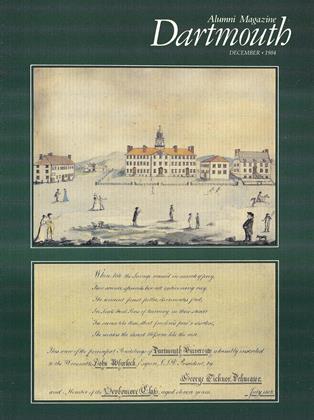A ground breaking,in depth study of the effects of the Vietnam War era on the members of one Dartmouth class is being undertaken by two members of the psychiatry department faculty. Several aspects of the study make it unusual if not unique: the idea for the study began with the subject class, '68; it is one of the first-ever in-depth studies of a Dartmouth class; it will involve current students in the gathering and analysis of information; and it has available baseline data taken on class members as undergraduates.
At both the 10th and 15th reunions of '68, the class ran reunion seminars which examined the impact of the Dartmouth experience and the Vietnam War with its associated political and sociological turmoil on classmates' life choices, values, and personal development. "Some of those present for the 15th reunion," explained Steve Calvert '68, organizer of that year's session,"argued that the uniqueness of these events had profound and enduring impact; others that the war years were a discrete episode and that they had long since returned to expected development paths." The class's efforts to assess the subject were so thought-provoking to some class members and to one seminar leader— Professor of Psychiatry Stanley Rosenberg that the idea was proposed as the focus of a serious psychiatric study. The project was formally endorsed by the 1968 executive committee, and Rosenberg recruited colleague Bernard Bergen to collaborate on the study.
Rosenberg noted that a preliminary search of the literature indicates that this will be the first in depth study of a Dartmouth class since 1940, and that even that effort had a much narrower focus.
The involvement of current students in the survey was the result of a suggestion from Vice Provost Gregory Prince. Subsequently, a Mellon grant was awarded Rosenberg and Bergen to conduct a research seminar within the Medical School curriculum and to undertake the study. The seminar will be held winter term and will be open to advanced undergraduates, medical students, clinical psychology graduate students, and psychiatric residents. The participants will assist in formulation of some measurement instruments and in initial analysis of results.
Perhaps the most noteworthy aspect of the study, however, is the availability to the researchers of baseline data of unusual breadth and depth. In the 1960s, all freshmen filled out a number of personality and value surveys during their first week on campus. By repeating these same measures 20 years later, the study will be able to make inferences about the impact of the Vietnam era on classmates' later lives. Such baseline data is not commonly found, according to Rosenberg. While other schools have attempted to do similar surveys, "no one else, to our knowledge, has done anything systematic with it," according to Rosenberg.
The survey will take part in several stages and is still in the early information gathering phase. A preliminary survey has been distributed to all class mates, and respondents to that will receive a more detailed questionnaire. "We very much hope that our classmates will participate in this extremely important study by completing and returning their questionnaires," noted Calvert. He said '68s who have misplaced their questionnaires can call him (603/646-3309) or Rosenberg (603/646-5834). Subsequent to the detailed survey, respondents near Hanover will be asked to participate in a face to face in terview.
Rosenberg expects the information gathering to go on for as much as a year. And while some initial conclusions may be drawn before the seminar disbands at the end of winter term, the final analysis of the data won't be available for two or three years.
 View Full Issue
View Full Issue
More From This Issue
-
 Feature
FeatureThe College Today
December 1984 -
 Cover Story
Cover StoryDartmouth Hall (1784-1984) A Bicentennial Tribute
December 1984 By Charlotte K. Younger -
 Feature
FeatureChronicling the DOC
December 1984 By David O. Hooke '84 -
 Feature
FeatureHanover's Bests
December 1984 -
 Article
ArticleLover of parades
December 1984 By Peggy Sadler -
 Class Notes
Class Notes1940
December 1984 By Richard J. Goulder
Article
-
 Article
ArticleDOES NEW HAMPSHIRE NEED A STATE UNIVERSITY ?
May, 1914 -
 Article
ArticleMAKING A NINE
April 1916 -
 Article
ArticleTHE PRESIDENT'S MESSAGE
APRIL 1929 -
 Article
ArticleCARNIVAL AND WINTER SPORTS
March 1934 -
 Article
ArticleBridge Honors Knights
May 1961 -
 Article
ArticleGEOGRAPHICAL DISTRIBUTION OF SCHOOLS SENDING STUDENTS TO DARTMOUTH
March 1917 By Howard Murray Tibbetts '00


